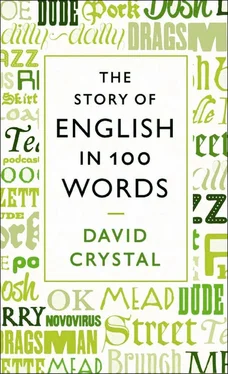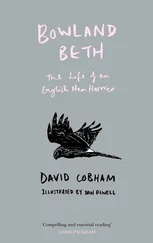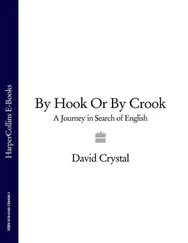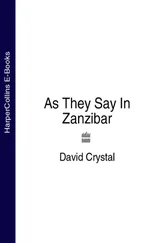This sort of vivid description is found throughout Anglo-Saxon poetry. It’s one of the earliest signs of an impulse to create figures of speech in English literature. It was an impulse that extended well beyond English, for similar word creations appear in the early poetry of other Germanic languages, such as the Viking tongue, Old Norse. But the Anglo-Saxon poets really took it to heart. There are over a thousand such descriptions in the great Old English saga Beowulf .
The coinages are called kennings , a word adapted from the Old Icelandic language. Kenning is from the verb kenna , ‘to know’, and it captures the idea that these coinages have a meaning that is more insightful than can be expressed by a single word. Ken is still used as a verb in Scots English and in some northern dialects of England. And we still hear it as a noun in the phrase beyond our ken .
The poets loved kennings, because they were opportunities to vary their descriptions when they told long stories of heroes and battles. Stories of this kind repeatedly refer to the same kinds of events, such as a battle, or a banquet or an army crossing the sea. We can easily imagine how a story could get boring if the storyteller said ‘And he crossed the sea in a boat’ a third, fourth or tenth time. How much more appealing would be fresh, vivid descriptions — especially ones that would suit the rhythm of the verse and echo the sounds of other words in his lines.
So, what could a ship be? A wave floater, sea goer, sea-house or sea steed . And the sea? A seal bath, fish home, swan road or whale way . Anything could be described using a kenning. A woman is a peace-weaver , a traveller is an earth-walker , a sword is a wolf of wounds , the sun is a sky candle , the sky is the curtain of the gods , blood is battle sweat or battle icicle . There are hundreds more.
Kennings don’t seem to have been much used outside of poetry, and they fell out of use after the Anglo-Saxon period. But the same poetic impulse lies behind many compound words. We hear it still when a scientist is described as an egghead , or a criminal as a lawbreaker or a boxer as a prize-fighter . But we don’t seem to take the same joy in creating vivid alternative descriptions as the Anglo-Saxons did.
Perhaps we should. Imagine a football sports commentary, for example, in which the commentators used kennings. They’d be talking about net-aimers and ball-strikers and perhaps, when things got exciting, score-cuddles, card-offs and ref-haters . Am I misremembering, or have I sometimes heard the occasional off-the-cuff kenning in a commentary? If so, without realising it, the bone-house is tapping into a tradition that is a thousand years old.
 12. Brock a — Celtic arrival (10th century)
12. Brock a — Celtic arrival (10th century)
During the 11th century, several books were written which listed the names of plants and animals, especially in relation to their medicinal properties. In one of the first, around the year 1000, we read this: ‘Sum fyðerfete nyten is, ðæt we nemnaþ taxonem, ðæt ys broc on Englisc.’ Translation: ‘There is a four-footed animal, which we call taxonem, that is brock in English.’
Brock , the Old English name for a badger. It was the everyday name until the 16th century, when badger took over in standard English. Why the change? Probably because brock had developed a number of unpleasant associations: people would talk about a stinking brock , and by 1600 the word had come to be applied to people who were dirty or who behaved in an underhand way — much as someone might use the word skunk today. In Shakespeare’s Twelfth Night (II.v.102), Sir Toby Belch sees Malvolio puzzling over the meaning of a letter and says Marry, hang thee, brock! Malvolio is indeed, badger-like, rooting out the sense. But Toby is also calling him a stinker.
Badger , by contrast, had positive associations in the 16th century. The word probably comes from badge , the white mark on the animal’s head being its most striking feature. Badges had strongly positive associations, being chiefly associated with the ‘badges of arms’ used by knights. The word was also being used, in the sense of a ‘distinguishing sign’, in the 16th-century translations of the Bible. So if people wanted an unemotional way of talking about the animal, badger would be more appealing.
But brock didn’t disappear. It stayed as the everyday name for the animal in regional dialects all over the British Isles and was especially popular in the north of England. Then it started to creep back into standard English — as a name. Brock the badger . It has appeared in countless sympathetic accounts of badgers by naturalists, and is the regular name used in children’s stories, most famously by Alison Uttley. Few other dialect words have achieved quite the same press.
Brock feels so English — so it comes as a bit of a surprise to discover that it isn’t Anglo-Saxon at all. It’s Celtic. We find it in Irish, Scottish Gaelic and Manx as broc , in Welsh and Cornish as broch , in Breton as broc’h . The animal goes under a quite different name in the Germanic languages, such as grævling in Danish and Dachs in German (dachsunds were bred to be badger hounds). It didn’t come over with the Anglo-Saxons. That’s what makes it linguistically interesting. It’s one of the very few words to have come into Old English from the Celtic language spoken by the ancient Britons.
Hardly any Old English words have a clear Celtic connection. There are a large number of place-names in England of definite Celtic origin, such as Avon , Exe and Severn , and all the names beginning with pen (‘hill’), such as Penzance and Penrith . But if we restrict the search to everyday words, in addition to brock , we find crag , wan , dun (‘grey-brown’), bannock (‘piece of a loaf or cake’) and a dozen or so others. A few more might have had a Celtic origin, such as puck (‘malicious spirit’) and crock (‘pot’), but similar-looking words appear in the Scandinavian languages, so we can’t be sure.
Why did the Anglo-Saxons ignore the Celtic words they would have heard all around them? There are many conflicting explanations. Perhaps the two ways of life were so similar that the Anglo-Saxons already had all the words they needed. Or perhaps there was so little in common between the Celtic way of life as it had developed in Roman Britain and the Anglo-Saxon way of life as it had developed on the continent that there was no motivation to borrow Celtic words. There might even have been a conscious avoidance of them. If the Celts were forced out of England by the invaders, as some people believe, then one of the consequences would be a distaste for all things Celtic, especially the language. On the other hand, some Anglo-Saxon noblemen gave their children British names, such as Cerdic and Cedd. Cædwalla, for instance, was king of Wessex in 685, according to the Anglo-Saxon Chronicle, and his is a distinctly Welsh name.
Whatever the reasons, Celtic words are conspicuous by their absence in Old English. Brock , crag and the others remain as an intriguing reminder of what might have been.
 13. English — the language named (10th century)
13. English — the language named (10th century)
Читать дальше

 12. Brock a — Celtic arrival (10th century)
12. Brock a — Celtic arrival (10th century) 13. English — the language named (10th century)
13. English — the language named (10th century)










